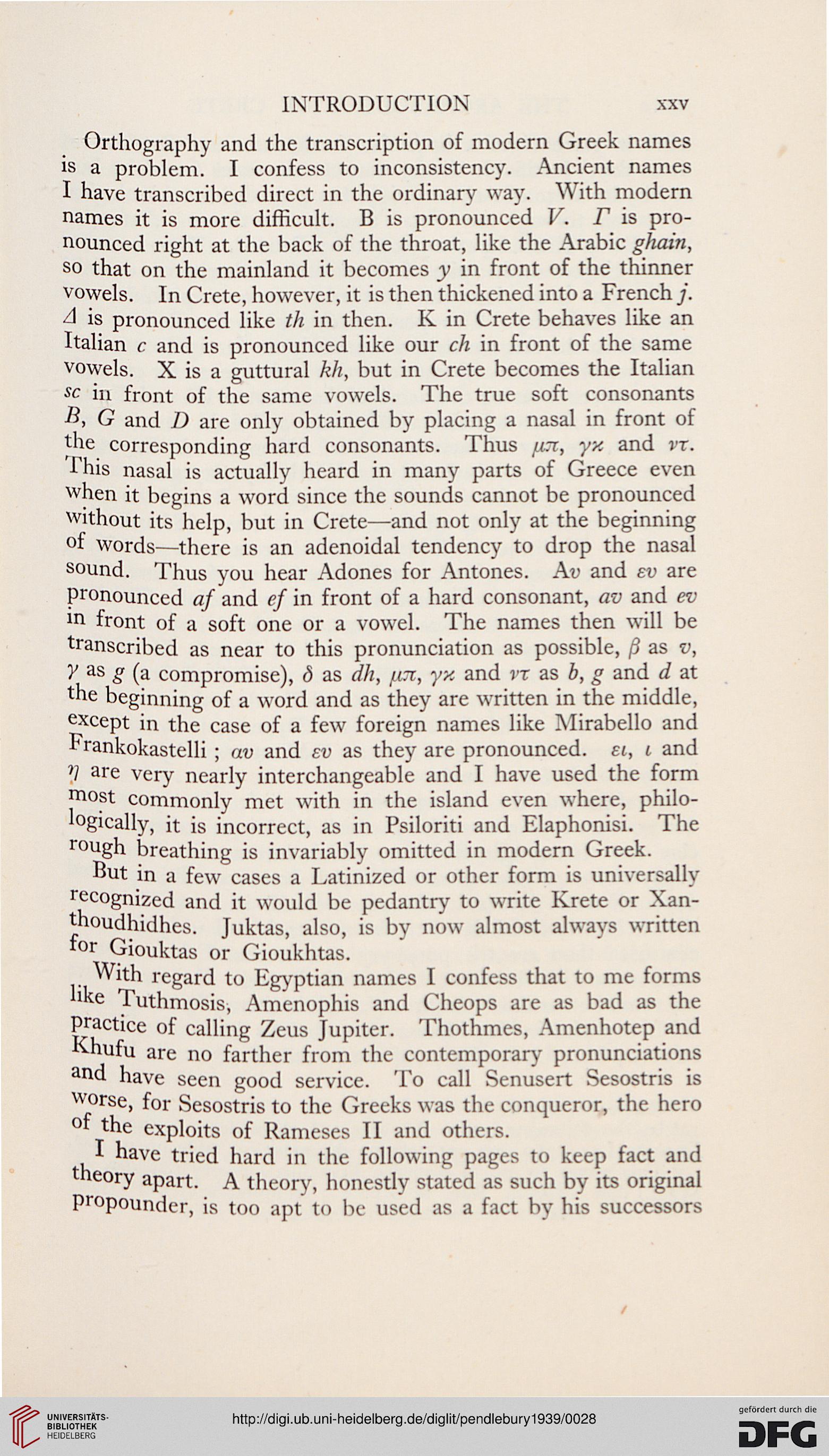INTRODUCTION xxv
Orthography and the transcription of modern Greek names
is a problem. I confess to inconsistency. Ancient names
I have transcribed direct in the ordinary way. With modern
names it is more difficult. B is pronounced V. T is pro-
nounced right at the back of the throat, like the Arabic ghain,
so that on the mainland it becomes y in front of the thinner
vowels. In Crete, however, it is then thickened into a French /.
A is pronounced like th in then. K in Crete behaves like an
Italian c and is pronounced like our ch in front of the same
vowels. X is a guttural kh, but in Crete becomes the Italian
sc in front of the same vowels. The true soft consonants
G and D are only obtained by placing a nasal in front of
the corresponding hard consonants. Thus fat, yy. and jt.
This nasal is actually heard in many parts of Greece even
when it begins a word since the sounds cannot be pronounced
without its help, but in Crete—and not only at the beginning
of words—there is an adenoidal tendency to drop the nasal
sound. Thus you hear Adones for Antones. Ad and ev are
pronounced af and ef in front of a hard consonant, av and ev
in front of a soft one or a vowel. The names then will be
transcribed as near to this pronunciation as possible, j? as v,
V as g (a compromise), b as dh, fax, yy. and vx as b, g and d at
the beginning of a word and as they are written in the middle,
except in the case of a few foreign names like Mirabello and
Frankokastelli ; at) and ev as they are pronounced, ei, t and
V are very nearly interchangeable and I have used the form
most commonly met with in the island even where, philo-
logically, it is incorrect, as in Psiloriti and Elaphonisi. The
rough breathing is invariably omitted in modern Greek.
But in a few cases a Latinized or other form is universally
recognized and it would be pedantry to write Krete or Xan-
thoudhidhes. Juktas, also, is by now almost always written
for Giouktas or Gioukhtas.
_ With regard to Egyptian names I confess that to me forms
like Tuthmosis, Amenophis and Cheops are as bad as the
Practice of calling Zeus Jupiter. Thothmes, Amenhotep and
Khufu are no farther from the contemporary pronunciations
and have seen good service. To call Senusert Sesostris is
worse, for Sesostris to the Greeks was the conqueror, the hero
°f the exploits of Rameses II and others.
I have tried hard in the following pages to keep fact and
theory apart. A theory, honestly stated as such by its original
propounder, is too apt to be used as a fact by his successors
/
Orthography and the transcription of modern Greek names
is a problem. I confess to inconsistency. Ancient names
I have transcribed direct in the ordinary way. With modern
names it is more difficult. B is pronounced V. T is pro-
nounced right at the back of the throat, like the Arabic ghain,
so that on the mainland it becomes y in front of the thinner
vowels. In Crete, however, it is then thickened into a French /.
A is pronounced like th in then. K in Crete behaves like an
Italian c and is pronounced like our ch in front of the same
vowels. X is a guttural kh, but in Crete becomes the Italian
sc in front of the same vowels. The true soft consonants
G and D are only obtained by placing a nasal in front of
the corresponding hard consonants. Thus fat, yy. and jt.
This nasal is actually heard in many parts of Greece even
when it begins a word since the sounds cannot be pronounced
without its help, but in Crete—and not only at the beginning
of words—there is an adenoidal tendency to drop the nasal
sound. Thus you hear Adones for Antones. Ad and ev are
pronounced af and ef in front of a hard consonant, av and ev
in front of a soft one or a vowel. The names then will be
transcribed as near to this pronunciation as possible, j? as v,
V as g (a compromise), b as dh, fax, yy. and vx as b, g and d at
the beginning of a word and as they are written in the middle,
except in the case of a few foreign names like Mirabello and
Frankokastelli ; at) and ev as they are pronounced, ei, t and
V are very nearly interchangeable and I have used the form
most commonly met with in the island even where, philo-
logically, it is incorrect, as in Psiloriti and Elaphonisi. The
rough breathing is invariably omitted in modern Greek.
But in a few cases a Latinized or other form is universally
recognized and it would be pedantry to write Krete or Xan-
thoudhidhes. Juktas, also, is by now almost always written
for Giouktas or Gioukhtas.
_ With regard to Egyptian names I confess that to me forms
like Tuthmosis, Amenophis and Cheops are as bad as the
Practice of calling Zeus Jupiter. Thothmes, Amenhotep and
Khufu are no farther from the contemporary pronunciations
and have seen good service. To call Senusert Sesostris is
worse, for Sesostris to the Greeks was the conqueror, the hero
°f the exploits of Rameses II and others.
I have tried hard in the following pages to keep fact and
theory apart. A theory, honestly stated as such by its original
propounder, is too apt to be used as a fact by his successors
/




